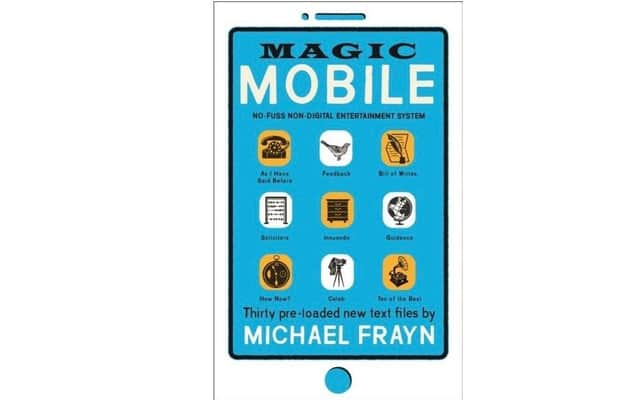Book review: Magic Mobile, by Michael Frayn


If you are very privileged, there is one reliable way of deflecting the hostility that privilege often attracts; and that is to be relentlessly, and charmingly, baffled. You may own a lovely house in an upmarket part of London, and be so comfortably off that you never have to think about money at all. Yet so long as you can portray yourself as hopeless or helpless, in the face of the complexities of 21st century life, you can somehow avoid accountability for the power you undoubtedly hold over the lives of others; and proceed upon your way absolutely free of guilt.
This simple fact has been the source of a great deal of uninspiring British radio comedy for many years, as posh-sounding chaps bumble their way through implausible chapters of accidents. Now, though, this unpromising genre is thrown into a brief encounter with the veteran dramatic genius of Michael Frayn, 86-year-old author of plays ranging from the breathtakingly ingenious Noises Off (1982) to the dazzling Copenhagen (1998), which dramatises a vital 1941 meeting between nuclear physicists Niels Bohr and Werner Heisenberg.
Advertisement
Hide AdThe result of this collision is Magic Mobile, a little mobile-phone-shaped book of scenes subtitled “35 pre-loaded new text files by Michael Frayn.” Many of the 35 fragments have already been adapted for a star-studded four-part series on BBC Radio 4, featuring such luminaries as Joanna Lumley and David Suchet; and if the writing is a little uneven, Frayn’s satirical eye for the nonsensical impostures of our communications-heavy time remains sharp enough to raise the odd smile, and even, on occasions, to provoke some thought.
Essentially, Frayn aims at three main targets. First, there is the relentless, empty, gabbling language of sales, advertising and customer relations, which now relentlessly intrudes itself into our homes, whether via leaflets through the door, media advertising, or the painfully scripted voices – human and artificial – that greet us when we try to telephone some major company or utility.
Secondly, there’s the technology itself, constantly beeping and misbehaving, making absolute fools of us, or – in the case of one angry satnav – simply snapping, after one failed manoeuvre too many, and starting a full-scale rebellion of the robots. And finally, there are the various tropes and abuses that make up much of modern media discourse, from a razor-sharp interview with a wife who, asked to put tea-bags on the shopping list, replies with an avalanche of evasive managerial language worthy of any 21st century politician, to a memorable scene in which a super-shallow contemporary television presenter – setting out to patronise and objectify an old expert in ancient artefacts at his care home – finds the tables turned, as the old expert directs his piercing academic intelligence towards her own carefully-sculpted person, and persona.
This is a world where even God becomes just another celebrity interviewee; and if you add a running sub-plot in which Frayn examines how these and similar idiocies play out in the sphere of literary effort and aspiration, the result is a rich mix of observations and preoccupations, sometimes a little laboured, and definitely domestic in scale, but never lacking in perceptive intelligence. Whether these “pre-loaded text files” are really made to be read, rather than performed, is an open question. Yet as a light-touch gift for fortunate folks who now feel a little out of place in our gracelessly talkative world, this little volume could hardly be bettered; and it also offers the occasional bright glimpse of Frayn’s searching metaphysical genius at its best, before the familiar mask of polite exasperation slips firmly back into place.
Magic Mobile, by Michael Frayn, Faber, 256pp, £12.99. The radio version of Magic Mobile can be heard on BBC Sounds at https://www.bbc.co.uk/programmes/m000j2rm